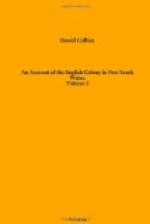Being limited in point of time (twelve weeks having been deemed by the governor sufficient for the execution of this service), the apprehension of losing a wind favourable for the prosecution of the principal object of the voyage, that of sailing through the strait, deterred them from attempting to reach the head of the river; but it was hardly to be doubted, that its principal source proceeded from some part near the point of union of the two chains of mountains. Allowing this supposition, a great part of its stream must be perfectly fresh; for at the place where they ended their examination, which was not more than half the whole supposed distance or length of the river, it had become half fresh half salt, although its breadth was from half a mile to a mile and a half, and its depth eight or nine fathoms.
The country which Mr. Bass had an opportunity of observing, was a certain portion of that lying within the angle formed by the two chains of mountains, and more especially of the parts which lay contiguous to the water, rather than of those situated in the vicinity of the chains.
The quality of the ground, taking it in the aggregate, was much superior to that of the borders of any of the salt water inlets of New South Wales, Western Port excepted (seen by Mr Bass on his first excursion in the whale boat). The vegetable mould was, however, found to be of no great depth, and was sometimes, perhaps advantageously, mixed with small quantities of sand.
The best of the soil was found upon the sides of sloping hills, and in the broad valleys between them. Some parts that were low and level had a wet and peat-like surface, bounded by small tracts of flowering shrubs and odoriferous plants, that perfumed the air with the fragrance of their oils.* These retained in general the appearance of those in New South Wales, while they were in reality very different. The rich and vivid colouring of the more northern flowers, and that soft and exquisite gradation of their tints, for which they are so singularly distinguished hold with those here, but in a less eminent degree. The two countries present a perfect similarity in this, that the more barren spots are the most gaily adorned. The curious florist, and scientific botanist, would find ample subject of exultation in their different researches in Port Dalrymple.
[* In this particular they differ from the flowering shrubs of New South Wales; none or very few of which were ever found, beautiful as they were in other respects, to possess the smallest particle of odour.]
Except in these places, the grass grows not in tufts, but covers the land equally with a short nutritious herbage, better adapted, possibly, to the bite of small than of large cattle. The food for the latter grows in the bottoms of the valleys and upon the damp flats. A large proportion of the soil promised a fair return to the labours of the cultivator, and a lesser ensures an ample reward; but the greater part would perhaps be more advantageously employed, if left for pasturage, than if thrown into cultivation; it would be poor as the one, but rich as the other.




